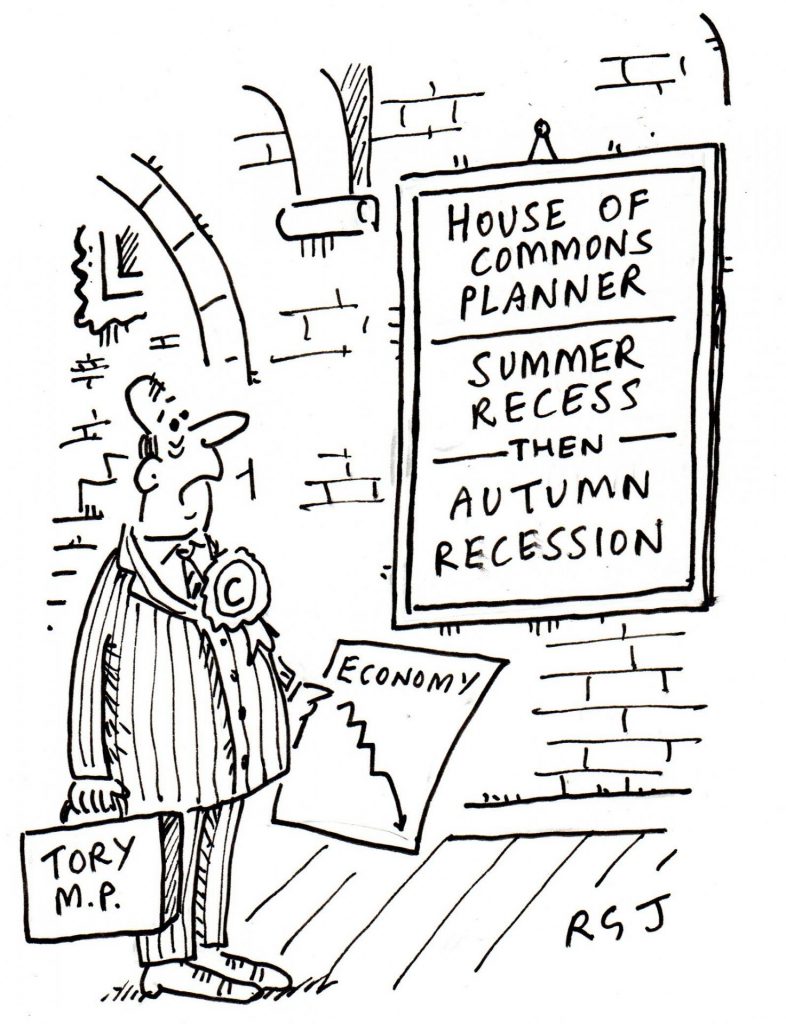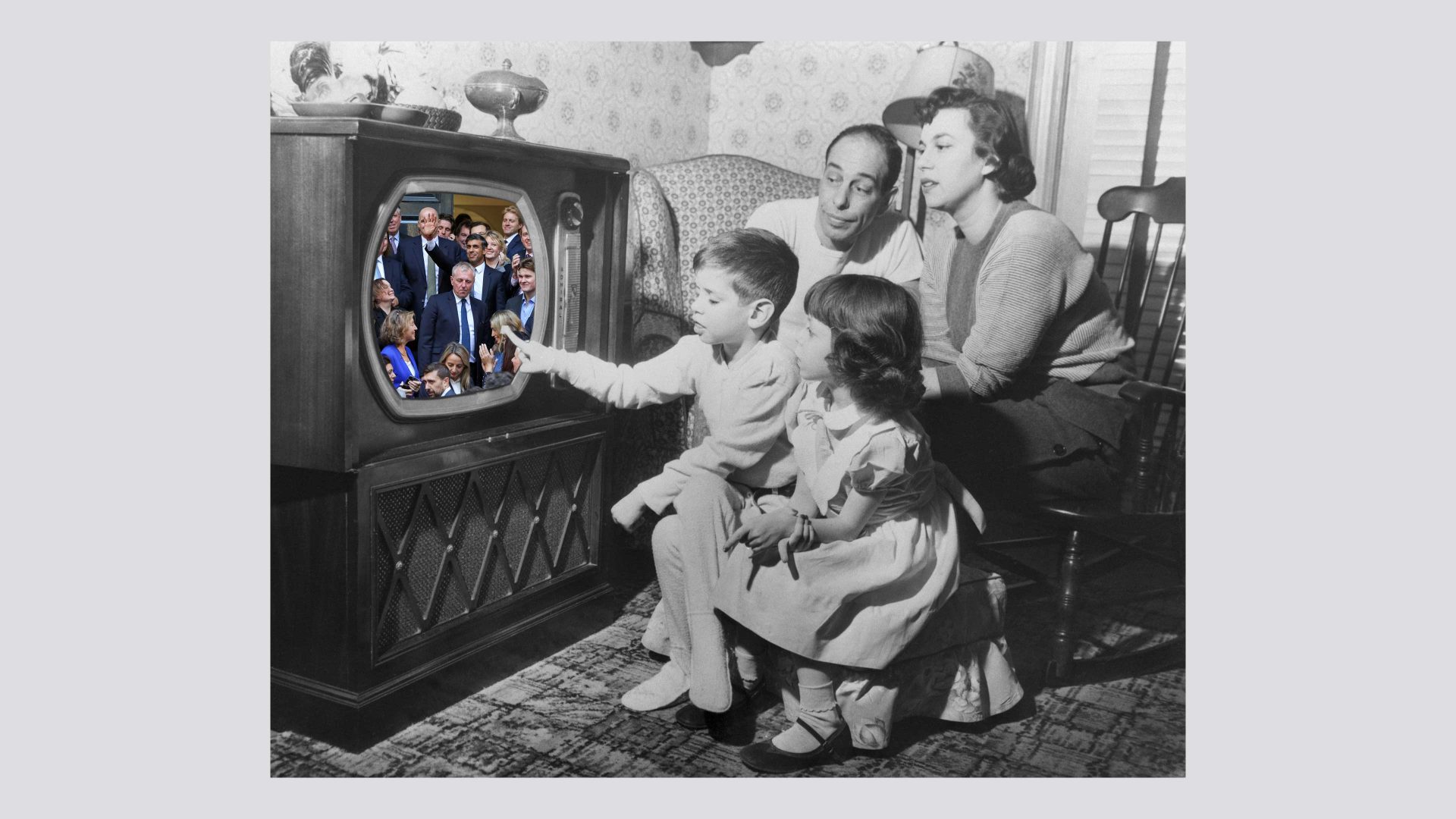For years now, we have not really had a serious government, but a grisly soap opera in which talentless characters like Suella Braverman, Gavin Williamson and Nadine Dorries are given starring roles, and prime ministers change almost as often as Chelsea managers. (Downing Street 5, Stamford Bridge 9 since the Brexit referendum).
For years, we have not really had a serious media, but dumbed-down political and commercial interests masquerading as purveyors of news, lurching from one spasm to another, taking much of what used to be the serious parts of the media in their wake. The unserious government and the unserious media are locked in a dumbed-down political embrace, combining to make us an unserious country.
A few months ago, we had the Gary Lineker spasm, in which a tweet by the former footballer turned broadcaster quickly became what radio show hosts like to call “the only thing anyone is talking about”, when what many were talking about was their wish that the media would talk about something else. Then we had the Huw Edwards spasm, a dubious story in a dubious dumbed-down newspaper leading to a full-blown crisis for the BBC, a crisis that blew out almost as quickly as it blew in, the only thing anyone was talking about suddenly being talked about no more.
And most recently we have had the Nigel Farage/Coutts spasm.
We might have had a Dan Wootton spasm, the allegations against the GBeebies presenter far more serious than anything thrown at Huw Edwards. And we might have had a Gina Miller spasm, she too seemingly having had troubles with her bank on account of her political activity.
But Wootton is very much part of the right wing media infrastructure, which plays down the sins of its own; and Miller is very much not, so any perceived injustice against her must likewise be played down.
Let’s look at what the three actual spasms, Gary-gate, Huw-gate and Nigel-gate, have in common. First, celebrity. Second, herd mentality. Third, a complete loss of perspective. Fourth, a prime minister and cabinet ministers who feel they have to get involved, when frankly they don’t.
If I had to write down the top thousand grievances and injustices in Britain today that should command the attention of a good prime minister, then Farage’s banking arrangements would not make the list. Yet Rishi Sunak just had to rush in, didn’t he? Bleating about the need for professionalism and integrity; this from the man who sat alongside Boris Johnson, Covid-partied with him, tolerated the lies, ventilated the gaslighting; then to get his job did a deal with Braverman and brought her back into government despite a recent sacking and breach of the ministerial code being on her record.
As the cabinet queued to fuel the Farage-as-victim narrative, they gave fresh legs to the lie that the nicotine-stained man-frog, a privately educated former City trader, is some kind of anti-establishment crusader on behalf of the “little people”. In so many ways he, and the right wing media once again doing his bidding, ARE the establishment.
They pushed a referendum on David Cameron. They won it, and have been moaning about their victory ever since, because the Brexit they get is never the one they thought they wanted. They have gone through four prime ministers in an attempt to find it, even as most of the rest of the country has realised they never will find it, because it doesn’t exist.
Farage has always been a creature of opposition, a campaigner, not a governor. What is really strange about the current chapter of the Tories’ 13-year soap is that the prime minister and the cabinet have become creatures of opposition too. Hopefully, before too long they will get the chance to do the real thing. I dread to think, however, what wretched, twisted media spasms await us between now and then.

Well done Sadiq Khan for holding firm on his plans to clean up London’s air. He has come under attack both from the Labour front bench, angry at their failure to win the Uxbridge by-election, and from the Tories, keen to “weaponise” (their word) the climate crisis, a strategy which alone merits not even thinking about putting them in for another term.
When news of the High Court ruling backing Khan against Tory councils opposing the extension of the Ultra Low Emission Zone came through, I texted the London mayor to offer congratulations and urge him to “keep going with the green crap” (copyright David “I will lead the greenest government ever” Cameron).
“Thanks,” came the reply. “You mean saving the planet and saving lives?” Quite.
As holiday reading goes, I did not expect to enjoy a 96-year-old book about bagpipes quite as much as I did. It was a gift from Nigel Wilcockson, the editor of my recent publication, But What Can I Do? He felt that reaching No 1 in the bestseller list was worth finding me something special from the stock of very old first editions.
Published in 1927, The Piper in Peace and War by Charles Malcolm is focused much more on war than peace. After all, more than a thousand pipers died in the first world war alone.
Raised in a family of pipers, taught to play by my father, I was aware that the bagpipes were long viewed as an instrument of war. But the many and varied accounts, going back several centuries, of pipers leading soldiers into battle made me wish my dad and my brother Donald, an ex-Scots Guards piper, were alive to read it.
They would have loved the story of George Findlater who, back in 1897, was awarded the Victoria Cross for heroics in the Battle of Dargai in north-west India. Wounded in both legs, he was unable to walk. Yet he propped himself up against a boulder and played on until he passed out. His fellow Gordon Highlanders went on to victory, and Findlater returned home to a kind of fame normally reserved for war leaders, even packing out theatres to tell his story.
More than a century before that, during the Jacobite uprisings, a piper named James Reid was less fortunate. Tried in York as a rebel army soldier, his defence was that he was a piper, not a soldier. The judge decided that as Highland regiments were always led to war by the pipes, they were an instrument of war. Reid was sentenced to death. And the designation of the bagpipes as an instrument of war survived to 1996.
Sticking with music, I was thrilled to be part of the Radio 4 Soul Music documentary about Jacques Brel’s Ne Me Quitte Pas, surely one of the greatest songs ever written. I was also pleased to get a French lesson from a listener, Chris Hinton, who pointed out that my translation of the song contained an error. I said Brel was telling his departing lover he would cross the earth to keep her – “je croiserai la terre” – but in fact he was saying “je creuserai la terre” – I will dig up the earth.
In the context of what follows, this makes sense … “pour couvrir ton corps, d’or et de lumière” – to cover your body with gold and light. Dig, not cross. No digging, no gold. Obviously!
Thanks, Chris. Forty-plus years I’ve been getting that one wrong.




